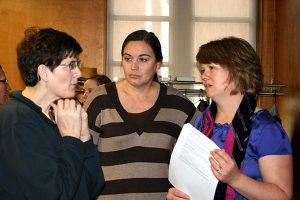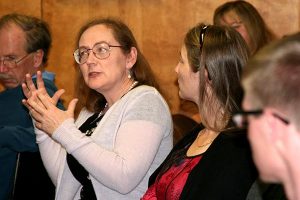By Jeanine Tietz
FORT WAYNE, Ind. — “If I do get pregnant tomorrow, it will not be because I prayed the right prayer for the right amount of time with the right amount of faith,” stated Katie Schuermann, author of the book He Remembers the Barren, in the opening presentation at the Infertility Ethics Symposium Nov. 7 sponsored by LCMS Life and Health Ministries at Concordia Theological Seminary, Fort Wayne, Ind. “It will be because God decides to give me, His beloved child, a gift that I neither merit nor earn.”

Schuermann, of Sherman, Ill., recounted her emotional struggle with accepting the “cross of barrenness” after experiencing the often-insensitive comments of community members, daunting medical infertility-treatments options and private-adoption complications.
“Many Christians don’t doubt that God can open wombs. What they seem to doubt is that God also closes them,” Schuermann noted while drawing attention to Rom. 8:28. She continued by stressing that children are God’s gift to give, not a gift to force.
About blessings
The Rev. Philip Zielinski of St. Paul Lutheran Church, Valley City, Ohio, echoed this approach in his presentation on adoption by saying, “Not every blessing is given to all, but all are given blessings.” Zielinski and his wife are the parents of five daughters — sisters who were adopted from Colombia.
As he related his family’s experience with the adoption process, Zielinski emphasized that adoption should be considered an act of mercy, not a response to God’s desire that humans be fruitful and multiply.
Both Zielinski and Schuermann also emphasized that grief over infertility alone is not necessarily a reason to adopt. In Zielinski’s words, “Adoption is not a consolation prize.”
Schuermann added that the struggle with infertility is also a war against the world’s religion of control.
In vitro fertilization
Dr. Donna Harrison, a board-certified obstetrician and gynecologist who is the executive director of the American Association of Pro-life Obstetricians and Gynecologists, shared her ethical concerns with the in vitro fertilization (IVF) process, which she termed “a completely unregulated industry in the United States.”

According to Harrison, couples and doctors involved in IVF choose “the best” embryos for implantation in the womb using prenatal genetic diagnosis, which tests the genes of the embryos in order to detect genetic abnormalities. The “abnormal” embryos would then be discarded in favor of embryos more genetically perfect. She pointed out that this makes the entire process inherently eugenic and reminiscent of events in history when certain humans were valued more than others.
Besides the financial costs of IVF — which can range from $53,000 to $120,000, Harrison stated that the three ethical problems with IVF are the concern for the “excess” embryos, the hidden costs to mother and child, and the uncoupling of the beginning of human life from the God-given context of bodily union.
She also said that children born through the IVF process have an increased risk of major birth defects, motor and hormonal abnormalities, mental disorders and stillbirth. Mothers have an increased risk of ovarian hyperstimulation syndrome (OHSS), complicated deliveries and ovarian cancer. In most cases, the embryos are treated like property, not people.
‘Snowflake Adoption’
The Rev. Dr. Scott Stiegemeyer, assistant professor of Theology and Bioethics at Concordia University, Irvine, Calif., explained during his presentation titled “The Ethics of Snowflake Adoption” that embryos created during the IVF process face five fates. They can be transferred into the biological mother, transferred into another woman, discarded, used for research or remain frozen.
Since some of these embryos are available for adoption, Stiegemeyer reminded listeners of their adoption as children of God and commented, “All adoptions are acts of grace.”
Although there is some concern that popularizing embryo adoption will normalize the IVF process, we must distinguish embryo transfer from IVF, Stiegemeyer stated.
In a poignant example, Stiegemeyer noted that since adult humans are never frozen against their will, embryos should never be frozen either. But the church’s obligation to care for frozen embryos is the same as its obligation to care for all children. To avoid helping frozen embryos is to label them as less valuable than other humans.
Care for the suffering
“Providing answers and producing solutions is neither [the pastor’s] place nor his vocation,” advised the Rev. Michael Salemink, executive director-elect of Lutherans For Life, during his presentation on pastoral care for those experiencing infertility.
Salemink said that pastors and fellow church members effectively care for people struggling with infertility when they listen first, ask open-ended questions and observe nonverbal communication. He also stressed the need to avoid language that God is “testing” the person.
Salemink recommends that a pastor “help his infertility sufferers recognize and resist the … temptations of pride and control” if they are measuring their worth by their ability to have children and not by their identity as children of God.
Schuermann said she experiences a wide range of responses to her barrenness, but that the most helpful response is when someone acknowledges the burden of barrenness and sits with her in her grief, simply listening.
She recommends that caregivers avoid making suggestions for how to “fix” infertility as well as avoid making false promises about the gift of children. She added that care-giving that is most consistent with the theology of the cross lets the situation be what it is.
During a panel discussion, the presenters encouraged caregivers to approach couples who have used IVF gently after the fact. They also fielded questions on birth control, IVF and whether or not embryo adoption violates the Sixth Commandment and the one-flesh union.
Schuermann urged pastors and church members to provide more feedback to the Synod on which infertility resources are needed and which areas of infertility ethics need more study.
Harrison encouraged those suffering from infertility to seek spiritual guidance, stating, “A doctor can tell you what is possible. A doctor cannot tell you what is right.”
A similar Infertility Ethics Symposium took place Nov. 8, 2014, at Concordia Seminary, St. Louis.
Jeanine Tietz (mrstietz712@gmail.com) is a freelance writer and a member of St. Michael Lutheran Church in Fort Wayne, Ind.
Posted Nov. 23, 2015




This looks like a wonderful follow-up and further development after the symposium on the same important topic here at St. Louis last year. Many thanks to the speakers who shared, and to ONM for taking these initiatives!